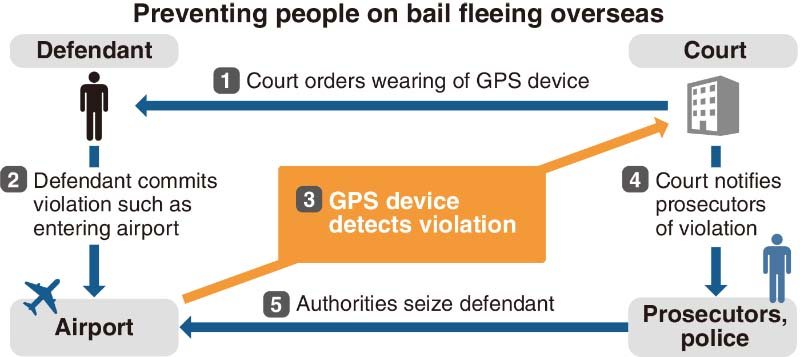
15:21 JST, April 5, 2022
Former Nissan Motor Co. Chairman Carlos Ghosn’s notorious escape overseas while on bail has led to efforts to develop monitoring systems using GPS devices, which will be tested from this fiscal year, The Yomiuri Shimbun has learned.
The Justice Ministry and the Supreme Court will jointly test a system, aiming to put it into operation as early as in the April 2026 to March 2027 fiscal year.
Firms wishing to join in the development are set to make their presentations later this month for the selection of a contractor to make a prototype that will be tested.
A GPS tag to be worn on the wrist or the ankle needs to be designed in such a way that allows a person to bathe or have the device recharged while still wearing it. Also, it needs to be difficult to remove the device once put on.
As for functions, the device needs to be able to send location information regularly, as well as to detect and notify related organizations of violations, such as if the wearer enters a prohibited area like an airport or port facility or removes the device.
As no existing domestic products are equipped with such designs and functions, the Justice Ministry and the Supreme Court have called for firms to develop a new device.
The tests will look to verify whether the trial device can detect violations. Technical issues, such as whether there are areas where location information is difficult to pinpoint and the duration of batteries, will be examined as well.
Ghosn, who was charged by public prosecutors of illicitly using Nissan funds and understating his remuneration, fled overseas at the end of 2019 while he was out on bail. The incident prompted the government to create a new system that requires defendants granted bail but feared to escape abroad to wear GPS devices.
The Legislative Council, an advisory body to the justice minister, has decided on the outline of revisions to the Criminal Procedure Code and other legislations necessary to put the new system in place, and submitted the report to Justice Minister Yoshihisa Furukawa. The ministry is making preparations to submit a draft bill of the revisions to the Diet.
According to the Legislative Council’s outline, the court can order a defendant to wear a GPS tag when granting bail, should it decide that there are possibilities for the defendant to flee abroad. Such defendants would, for example, be foreign nationals who have overseas bases and wealthy people with abundant capital to fund an escape.
When GPS devices detect violations, the relevant court will be notified and the public prosecutors and other authorities contacted by the court will take the defendant in question into custody.
The Justice Ministry and the Supreme Court requested about ¥40 million to fund the development, testing and commissioning of the device. The amount was included in the supplementary budget for fiscal 2021 that passed the Diet in December. The Supreme Court will also proceed with making rules for operating the envisaged system.
Top Articles in Society
-

Producer Behind Girls Group XG Arrested for Cocaine Possession
-

Man Infected with Measles Reportedly Dined at Restaurant in Tokyo Station
-

Man Infected with Measles May Have Come in Contact with Many People in Tokyo, Went to Store, Restaurant Around When Symptoms Emerged
-

Woman with Measles Visited Hospital in Tokyo Multiple Times Before Being Diagnosed with Disease
-

Australian Woman Dies After Mishap on Ski Lift in Nagano Prefecture
JN ACCESS RANKING
-

Japan PM Takaichi’s Cabinet Resigns en Masse
-

Japan Institute to Use Domestic Commercial Optical Lattice Clock to Set Japan Standard Time
-

Israeli Ambassador to Japan Speaks about Japan’s Role in the Reconstruction of Gaza
-

Man Infected with Measles Reportedly Dined at Restaurant in Tokyo Station
-

Videos Plagiarized, Reposted with False Subtitles Claiming ‘Ryukyu Belongs to China’; Anti-China False Information Also Posted in Japan




















